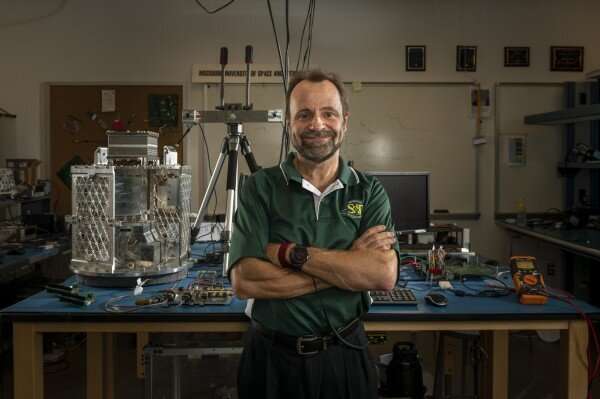This article has been reviewed according to Science X's editorial process and policies. Editors have highlighted the following attributes while ensuring the content's credibility:
fact-checked
trusted source
proofread
Spacecraft design expert discusses the viability of interstellar travel

Researchers at NASA recently announced the discovery of another planet about 95% the size of Earth that is 100 light-years away and could potentially sustain life.
Could this new discovery lead to humans one day traveling to planet TOI 700 e and enjoying its resources, such as the potential for liquid water? This is a question people may naturally ask, but they may not like the current answer.
"That is not going to happen in our lifetimes, but it is fascinating to discuss," says Dr. Hank Pernicka, Curators' Distinguished Teaching Professor of aerospace engineering at Missouri S&T. "This planet is 100 light-years away. That means if we developed a spacecraft to go the speed of light, it would still take 100 years to reach this destination."
The speed of light is 186,000 miles per second. Pernicka, who is an expert in spacecraft design, says the first issue to consider would be getting a vehicle to reach the speeds necessary for interstellar travel.
"There would be lots of showstoppers with this, the first of which is even getting that fast," he says. "The concept of a light-year and the distance involved in this travel is mind blowing."
Pernicka says another area to consider would be the number of uncertainties with the spacecraft itself.
"When traveling at these speeds, there would be a large amount of variables to consider," he says. "For example, even a little piece of debris in the path of the spacecraft could do a large amount of damage."
The way in which the spacecraft is fueled would also have to be considered. Currently, any long-distance missions sponsored by NASA use nuclear power, and that fuel source would eventually be depleted.
For example, NASA's Voyager 1, which was launched in 1977 and is the only spacecraft to travel to interstellar space, will likely run out of fuel in the next few years. This space probe, which travels at speeds of around 38,000 mph, is now over 14.8 billion miles from Earth.
"Voyager 1 has been on an amazing journey and has blown all of NASA's expectations out of the water," Pernicka says, "but this is still nowhere near the distance of even one light-year."
Pernicka says the key to one day reaching the necessary speeds may lie in the concept of solar sailing, which would propel spacecraft by using the pressure of the sun's radiation. Another option may be using a wormhole, he says, but neither option would be a possibility anytime soon.
"With a wormhole, that would almost be a form of cheating," he says. "However, it could theoretically work. In that situation, we would need to develop the spacecraft so it could survive the journey, which could be very violent."
Even though interstellar tourists or even space probes may not travel to planet TOI 700 e soon, Pernicka still has hopes for the future of space travel and the contributions made by Missouri S&T.
Pernicka says the university has professors in multiple disciplines researching the cosmos in various ways. He says that his current projects include developing satellites with thruster technology that will be launched in the coming years in collaboration with NASA, as well as inspector satellites for the United States military.
"The research we are doing is out of this world," Pernicka says. "I am excited to see how our efforts continue to affect space travel in the future."
Provided by Missouri University of Science and Technology




















